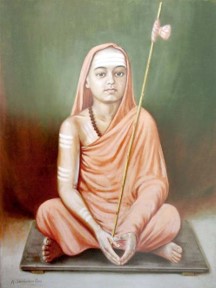Talk:Child Prodigies
By Vishal Agarwal
We encounter several kids who are amazingly talented in certain areas, such as painting, music, and mathematics, even though they receive the same education as the other kids. It seems that these children are naturally gifted from birth in their talents, and do not have to struggle as much as other kids to become masters of certain skills. We call these naturally gifted kids child prodigies.
It is said that Śrī Madhvācārya (1197–1273 CE), who grew to become one of the greatest teachers of the Vedānta, used to master his lessons in Śāstras without the slightest effort. His teachers would get upset seeing him play all the time, and scold him to pay more attention to his studies. But Madhva always replied, “I think it is a waste of time to keep repeating the scriptures like a parrot, because I mastered them as soon as you taught me.” When the teachers asked Madhva to repeat his lesson, the child would recite entire chapters of Sanskrit lessons from memory, much to the astonishment of his teachers as well as his friends! He also came first in all sports, such as running, swimming, and wrestling.
Similarly, Śaṅkarācārya (~700 CE) wrote his famous commentaries on Vedāntic scriptures by the age of sixteen years. Jñāneśvar wrote his famous commentary on the Bhagavad Gītā at the age of seventeen. In the Western world, the famous musician Wolfgang Mozart played the piano at the age of three, the violin at the age of four, and composed his first full-length opera at the age of seven.
An argument against child prodigies resulting from past life influences is,
“…if previous knowledge can be brought into a fresh incarnation, why doesn’t it happen more often? As many people possessed great knowledge and skills in the past, child prodigies should be reasonably common, yet in reality, such gifted children are rare, which seems to suggest other, more prosaic reasons for such early ability.”[1]
A potential response would be,
“…It should be recognized that only recently have there been such large numbers of scientists, musicians, artists, and academicians on the planet; in past centuries, such people were comparatively rare. As such, there would have been a very small “pool” of highly knowledgeable (or academic) souls out there looking to incarnate, making prodigies uncommon. Additionally, some prodigies may be born into a third-world culture in which such innate skills lie dormant and undiscovered, and it is even possible that only some souls are capable of transferring knowledge gained in one lifetime into the next or that it may be done only in special cases for specific reasons. While child prodigies are rare, however, gifted children are not. Everyone knows children who are especially quick learners and seem to operate on a higher academic level than their peers. Could it be that those children we consider gifted or especially bright were educated individuals in a past life who, while no longer retaining the specific knowledge they held in that earlier incarnation, still retain the habit of learning they acquired then? The knowledge itself may not survive, but perhaps simply the desire to learn is the residual echo of an educated past life. Could that explain the apparent disparity we see in our educational system, where some students seem to excel while others struggle to drop out entirely?”[2]
Several critics, however, attribute the development of child prodigies to genetics or conditioning. However, this does not seem to be a very satisfactory solution:
“Genetic inheritance fails to provide an answer to childhood genius. Moreover, the children of a genius rarely turn out to be like their parents. This leaves two more possibilities. One is the environmental conditioning. Yet, how much conditioning can be instilled in three to four-year-old children? Therefore, the only satisfactory explanation for the above to attain mastery in their respective fields at a young age is the karmasaṃskāras [impressions of past karmas] of collective efforts in their past births.”[3]
References[edit]
- ↑ Danelek, J. Allan. The Case for Reincarnation. Llewellyn Publications, 2010, Woodbury, Minnesota (USA), p. 25.
- ↑ Danelek, J. Allan. The Case for Reincarnation. Llewellyn Publications, 2010, Woodbury, Minnesota (USA), pp. 25–26.
- ↑ Sadhu Mukundacaraṇadāsa. Karma and Reincarnation in Hinduism. 3rd Revised Edition, Swaminarayan Akṣarapīṭha, 2016, Ahmedabad (India), p. 62.

